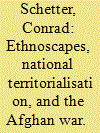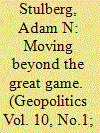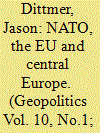|
|
|
Sort Order |
|
|
|
Items / Page
|
|
|
|
|
|
|
| Srl | Item |
| 1 |
ID:
060800


|
|
|
|
|
| Publication |
2005.
|
| Summary/Abstract |
This article pursues the question of how the territorialisation of power in the establishment of the Afghan nation-state has affected the spatial perceptions of political actors and the population at large. This question is particularly topical as spatial references are at present the driving force behind an ethnicisation of politics in Afghanistan. These perceived ethnic spaces, so-called ethnoscapes, not only compete with one another, but also contradict Afghanistan itself as a national territory. Thus since the outbreak of the Afghan war 1979 various political actors have been attempting to mobilise their constituencies over ethnic issues in order to use references to the spatial origins and expansion of their ethnic category to legitimise political claims. The principal argument of this article is that the population’s strong identification with the national territory of Afghanistan has to date prevented an ethnicisation of the masses in the Afghan conflict. Furthermore the article argues that the irreconcilability of the various perceived ethnic territories is an obstacle to the currently much-discussed establishment of ethno-federalism.
|
|
|
|
|
|
|
|
|
|
|
|
|
|
|
|
| 2 |
ID:
060803


|
|
|
|
|
| Publication |
2005.
|
| Summary/Abstract |
Changes toward the de-territorialising of sovereignty and the corresponding emergence of various global institutions, associated with globalisation, can offer new incentives and possibilities for the resolution of seemingly intractable ethno-national conflicts, by rethinking them in a transnational context. Peace processes in Northern Ireland and Israel shared a common vision, associating conflict resolution with global integration, but differed profoundly in their structures, dynamics and outcomes. The Good Friday Agreement in Northern Ireland was based on a complex power-sharing model between Protestants and Catholics, which would supposedly allow both to express their national identity. On the other hand, the peace process between Israel and the Palestinians, despite the vision of the globalised ‘New Middle East’, was based on partition that would lead to the making of two separate states. The dynamics and outcomes of the peace processes in Israel/Palestine and Northern Ireland provide for a comparative study of these approaches in the wider context of globalisation and their contribution to the transformation of the conflict and, consequently, its stability.
|
|
|
|
|
|
|
|
|
|
|
|
|
|
|
|
| 3 |
ID:
060802


|
|
|
|
|
| Publication |
2005.
|
| Summary/Abstract |
This article examines the practices of governance enacted within the framework of the international administration of Kosovo, which was established in 1999. I analyse the complex interplay between power and the liberal-democratic norms around which the UN-led mission defined its role in the province. The international administration exercised significant power in the legal/institutional reconstruction of the province, and in its systematic attempts to socialise Kosovars into accepting Western-based norms of liberal democracy as the only reasonable foundation of their polity. At the same time, however, the norms advocated by the international administration proved to be the source of a certain degree of power for the people of Kosovo. Specifically, those norms provided the framework within which Kosovars were able to criticise the international administration, and to claim the right to greater participation in decisions regarding the province. Over the past couple of years, Kosovo has witnessed the emergence of a shared normative framework within which the international administrators and Kosovar political elites articulate often competitive truth claims about the problems of the province, and mobilise different forms of power in support of those claims.
|
|
|
|
|
|
|
|
|
|
|
|
|
|
|
|
| 4 |
ID:
060798


|
|
|
|
|
| Publication |
2005.
|
| Summary/Abstract |
Emboldened by the recovery of the domestic oil industry and determined to exploit comparative advantages in world markets, President Putin put Russia once again on the move to secure control over Caspian energy spoils. The revitalization of Moscow's posture renewed debate over the contours of geopolitical competition in the region, and the effectiveness of non-military instruments of statecraft more generally. Yet, much of the controversy is misplaced due to empirical and theoretical oversights. The first is due to a misreading of the record of Moscow's Caspian energy posture, and an under-appreciation for the mixed success of Russia's energy leverage across the oil and gas sectors. The second comes from the failure to understand the conditions under which institutionally weak states can manipulate markets and regulatory mechanisms in global energy relations for purposes of national security. The article offers a first cut at substantiating these claims by examining the geoeconomic dimensions to Russia's Caspian energy policy.
|
|
|
|
|
|
|
|
|
|
|
|
|
|
|
|
| 5 |
ID:
060801


|
|
|
|
|
| Publication |
2005.
|
| Summary/Abstract |
This essay investigates the contemporary evolution of the symbolic shape of Central Europe by conducting a quantitative and qualitative content analysis of newspaper articles from the Lexis–Nexis database covering NATO and EU expansion. The results of this content analysis show that Central Europe is associated with different symbolic shapes at different times and in different political contexts, and therefore the idea of one hegemonic Central Europe, either transcending time and context or tied to an institutional identity, is a fallacy. ‘Central Europe’ has shaped NATO and EU expansions, but similarly those processes have constructed differing geopolitical images of Central Europe that are mediated to the consumers of the newspapers. In contrast to these differing symbolic shapes, a series of common structures of expectation were associated with Central Europe that constructed the region as different from Eastern Europe
|
|
|
|
|
|
|
|
|
|
|
|
|
|
|
|
| 6 |
ID:
060799


|
|
|
|
|
| Publication |
2005.
|
| Summary/Abstract |
Without denying the importance of his contributions to regional, economic, historical and urban geography, a rediscovery of Jean Gottmann’s political geography and its current geopolitical relevance has been taking place in Europe since the 1990s. The relative absence of his name in most of the subfield historical accounts, in contrast to the international reputation of his book Megalopolis has inspired this article, which attempts a survey of Gottmann’s key contributions to political geography, with emphasis on those in French. A bio-bibliographical analysis, enhanced by original references to archival source, was necessary for reconstructing the genesis and development of his political geography. Specifically, Gottmann states that territory is a psychosomatic device because its political partitioning is produced by the psychological oscillation in pertinent communities between search for security and search for opportunities. In the conclusions, a few questions are raised about how his theories could be applied to improving our understanding of the contemporary geopolitical scenario. The concept of territory, with its material and psychological components, is a psychosomatic expedient necessary to preserve freedom and the variety of separated communities in an interdependent and accessible space.— Jean Gottmann, ‘The Evolution of the Concept of Territory’, Social Science Information 14/3–4 (1975) pp.29–47.
|
|
|
|
|
|
|
|
|
|
|
|
|
|
|
|
|
|
|
|
|